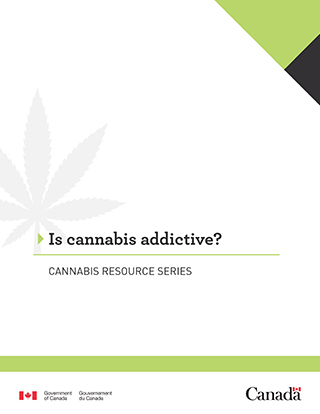Is cannabis addictive?
Cannabis resource series

Download the alternative format
(PDF format, 132 KB, 6 pages)
Organization: Health Canada
Date published: 2018-10-03
On this page
Key messages
- Cannabis is addictive, though not everyone who uses it will develop an addictionFootnote 1 Footnote 2
- If you use cannabis regularly (daily or almost daily) and over a long time (several months or years), you may find that you want to use it all the time (craving) and become unable to stop on your ownFootnote 3 Footnote 4
- Stopping cannabis use after prolonged use can produce cannabis withdrawal symptoms.Footnote 5
- Know that there are ways to change this and people who can help you. Further information is available at www.Canada.ca/cannabis.
Additional messages for youth
- When you are a teen or young adult and your brain is still developing, you are likely to become addicted to cannabis.Footnote 6 Footnote 7
- Cannabis addiction can have negative effects on how you study, work and hang out with your friends.Footnote 3
- If you are concerned about your cannabis use, talk to a trusted adult and learn ways that can help you avoid becoming addicted.
Supporting information
For: Medical and public health professionals, parents, educators and other adult influencers. It can also be shared with interested adults and youth as needed.
What do we know about addiction to cannabis?
Research has shown that using cannabis regularly (daily or almost daily) and over a long time (several months or years), especially when use begins in early adolescence (i.e. age 16 and under), can cause changes in the way the brain and body respond to cannabis and lead to problems with cannabis use and addictionFootnote 8
Addiction can occur at any age, but the chances are higher while the brain is still developing, which can continue until around 25 years of age.Footnote 4 As well, the younger an individual is when they begin using cannabis, the higher their risk of health problems, including addiction and other mental health issues including psychosis, schizophrenia, social anxiety, and depression.Footnote 9
Recent US national data estimate that 1 in 3 individuals who use cannabis will develop a range of problems with cannabis use that will have an impact on their daily lives.Footnote 10
The term Cannabis Use Disorder encompasses the concept of a range of problems with cannabis use. When using cannabis has a significant (medium to severe) impact on daily life this can be considered an addiction to cannabis.
Roughly 1 out of 10 people who use cannabis will develop a cannabis addictionFootnote 11. This number rises to up to 1 out of 2 people among individuals who use cannabis daily or near-daily.Footnote 12 While males have higher rates of cannabis addiction, females typically progress more quickly to cannabis addiction than malesFootnote 13. A number of factors can increase the likelihood of developing a Cannabis Use Disorder or addiction including: trauma, a personal or family history of alcohol or drug problems, lower income level,Footnote 6, genetic factors,Footnote 14, being male, persistent anti-social behaviours, persistent cigarette smoking,Footnote 15 and positive response to cannabis at first use.Footnote 16
Defining addiction
When someone regularly uses cannabis to the point that it is having negative consequences, they may have developed a loss of control over their use and be addicted. They may not be aware that this has happened and that their behaviour is causing problems for themselves and others.
Addictive disorders can produce a range of symptoms that were previously (DSM-IV) described using the terminology “psychological dependence” and physical dependence. In the new DSM-5, addictive disorders related to cannabis are defined as Cannabis Use Disorder, a condition that can impair the ability to control use, and have social impact. The impact may be broad, including impaired control, social impairment, risky use and pharmacological criteria (including tolerance and withdrawal).
What is a Cannabis Use Disorder?
Cannabis Use Disorder is the medical term for a spectrum of patterns of cannabis use leading to significant impairment or distress, including health problems, persistent or increasing use, and failure to meet major responsibilities at work, school, or home. It can range from mild, to moderate, to severe, depending upon how many of the symptoms described below are present. Individuals must show at least 2 symptoms over a 12-month period to receive the diagnosis of a Cannabis Use Disorder. More information on Cannabis Use Disorder can be found in the American Psychiatric Association’s Diagnostic and Statistical Manual of Mental Disorders, 5th Edition. If you have questions about Cannabis Use Disorder, please discuss with your healthcare professional.
Withdrawal symptoms
Individuals who stop using cannabis, especially after frequent (daily, almost daily) use may experience withdrawal symptoms.Footnote 5. Withdrawal symptoms can be mental and physical.Footnote 2. The intensity of withdrawal symptoms, especially mood and sleep disruption, increases the risk of relapsing into cannabis use.Footnote 17. An individual is considered to suffer from cannabis withdrawal if they have at least 2 mental symptoms and at least 1 physical symptomFootnote 2. These symptoms typically begin within 1 or 2 days after stopping use and can last for a few weeks and may includeFootnote 18:
- Mental symptoms:
- Craving
- Irritability, anger, or aggression
- Nervousness or anxiety
- Sleep difficulty (e.g., insomnia, disturbing dreams)
- Decreased appetite or weight loss
- Restlessness
- Depressed mood
- Physical symptoms causing significant discomfort:
- Abdominal pain
- Shakiness/tremors
- Sweating, fever, or chills
- Headache